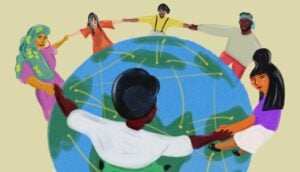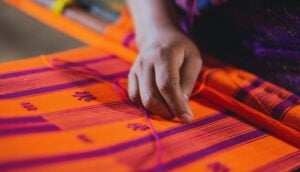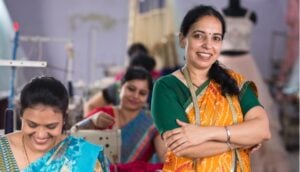Women have long been the backbone of our planet’s agricultural production. The United Nations’ Food and Agriculture Organization (FAO) estimates that women today make up 60 to 80 percent of the farmers present in non-industrialized countries and that up to 70 percent of agricultural labour in some countries comes from women alone. This is a staggering number. And it is also a clear indicator of the vital role women play in feeding the world. However, despite the important contributions made by women farmers, the unfortunate reality is that most of them work long hours that go unnoticed and, above all, unrewarded. Just because they are women.
Fairtrade Africa recently conducted a gender study that showed the progressive efforts that have been made towards achieving gender equality within Fairtrade-certified producer organizations. This study discovered that structural challenges, such as non-inclusive governance structures within producer organizations, ultimately constrain women farmers’ empowerment and their access to key services. In fact, a common occurrence across a number of the countries surveyed is that gender progressive policies and laws are often poorly translated into planning and implementation programs. At the same time, systemic and cultural challenges, such as discriminatory social norms and gender stereotypes, impede progress toward women farmers’ empowerment. Most crucially, women farmers, unlike their male counterparts, face significant challenges in acquiring the necessary resources to increase productivity in their farms.
In other words, when it comes to global agricultural production, the gender opportunity gap remains inexcusably high. And this dramatic situation is further compounded by the fact that many women farmers have limited or no education at all. This puts them at a stark disadvantage when it comes to competing for leadership positions in their farmers’ cooperatives or contributing to key decision-making processes that affect cooperative operations or even their own produce. Women are also frequently assigned to positions with little decision-making powers, including in committees where leadership is dominated by men. This needs to change.
At Fairtrade, we remain committed to building a fairer future for all. But we also know that a fairer future for all means gender equality now. That’s why our continued efforts in addressing gender inequalities on the ground continue with great success. Take our Women’s Schools of Leadership which work towards gender equality through training programmes designed to build up leadership skills, knowledge of budgeting and accounting, saving, and investing in new opportunities. In Cote d’Ivoire, for example, Fairtrade Africa worked in this very manner to support female farmers in utilizing smart farming strategies to diversify their income, develop their skills to set up businesses and become leaders in their Fairtrade certified cocoa cooperatives. At the same time, in Kyrgyzstan, a year-long Gender Leadership School course taught women to understand equality and what their rights are, while learning business skills and ways of monitoring and managing resources. Fairtrade’s Women’s Schools of Leadership improve women farmers’ confidence levels so that they can meaningfully participate in voicing their concerns and negotiate and advocate for inclusion in those spaces that are traditionally male dominated.
Fairtrade’s dedication to gender equality is rooted in our ethos and the Fairtrade Standards place particular emphasis on gender equality. Fairtrade Africa, for instance, ensures that all its Fairtrade-certified producer organisations have an understanding of the gender clauses in the Standards. We do this by providing support to producer organisations and ensuring their gender policies remain compliant through the establishment of gender committees. In addition, we train them to address gender-based issues such as discrimination, gender-based violence, and sexual harassment.
Above all, Fairtrade Africa conducts gender analyses which help inform us of the gender gaps present across the ecosystem and how we can support relevant producer organizations in bridging them. This is in line with Fairtrade’s philosophy of empowering farmers so they can take charge and have control over their businesses, their livelihoods, and their futures. Producer organisations must be intentional and strategic in contributing to gender equality and women empowerment. Fairtrade’s approach honours that commitment.
Fairtrade is a critical tool for achieving gender equality and fairness. And it is why Fairtrade certified cooperatives do better than non-certified ones in women’s representation in leadership positions. But we cannot do it alone. Businesses everywhere must enact policies that support gender equality on the ground, in their supply chains, and in their boardrooms. It is critical that all businesses conduct gender audits to know how they measure up in contributing to gender equality and that they implement necessary policies to address any lacunae found across their organizations. Moreover, businesses should make deliberate efforts to contribute to women farmers’ empowerment by marketing their products, making room for them in their commercial spheres of influence, and encouraging consumers to make ethical purchases that further the gender equality mission. With women forming the bulk of workers in the agricultural space, it is time for all supply chain actors to step up and do their part to ensure women farmers are given their just rewards. Only by working together on this common goal can we guarantee that the future is both a fair and gender-equal one for all.










